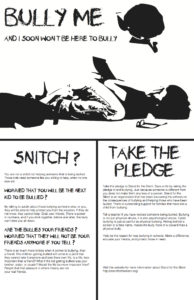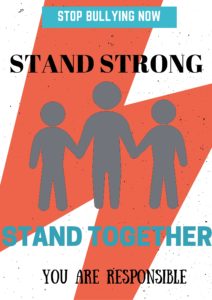Tasha Alexander, Zachary Berman, Ally Calvert, Hannah Hennessy, Reed Timmer
We researched the subject of the prohibitive culture of snitching. We found that there is a fear of snitching, not only because of the social repercussions of peers finding out, but also because of ineffective action taken by the confidant the person being bullied turned to for help. The documentary Bully tells the story of five students who struggle daily with bullying. Three of the students attempt to commit suicide, and two succeed. The adults in the film were ineffective in stopping the bullying or even exacerbated it. We also read a paper called Age, Race, Class and Sex: Women Redefining Differences, by Audre Lorde. It discusses societal norms that each generation passes down to each other and questions why we continue carrying some of these norms if they preach inequality. This applies to bullying, as society teaches children that they are superior to others because of the intelligence, race, gender, or athletic ability. Rather, society should take feminist social justice approach, where people are treated as equals without uncontrollable factors giving certain people power.
The importance of Bully, is to show and tell stories of kids who might not get a chance to share their side of the story, because of the fact that they are scared to tell on the bully. The obvious repercussions of the movie are suicide and two out of the five kids who were bullied commit suicide. This shows how bullying people, cannot only change one person’s life, but everyone who was close to the person who was bullied. In Age, Race, Class and Sex: Women Redefining Differences, demonstrates different inequalities that they go through, what they do to get through it, and how it changed their lives. It also shows how social norms can be considered bullying. Just because some one is different, doesn’t mean that they are not as important as a dominant class of people.
In relation to the prohibitive culture of snitching and what we found in our research, all the information we found can help change the way people understand and talk about bullying. Specifically, the education of all parties involved in a bullying situation needs to be implemented in order for bullying situations to be taken seriously and for them to stop. The ramifications however could be that the bullying situation gets worse as the snitch or the person trying to share information about the bullying situation could get picked on or hurt just as much as the victim. In order for this to be avoided, a number of people need to come forward in an effort to stop the bullying at its source all at the same time. There is power in numbers and if multiple people come after the situation to try and stop it, the bully then can’t in turn victimize the information sharer because there are so many people that would be involved. Sharing information and snitching can be a vital asset to a bullying situation in order to make sure the victim doesn’t go through any more harm, and another ramification could be that information or people snitching on a bullying situation could go away. In order to avoid this, it is important to make sure that the environment to share information is a friendly one with assurance that anyone who comes forward to help is doing a positive thing and does not have to worry whatsoever.
Our recommendation for social change is to get every school involved with the Stand for the Silent organization. This organization has made great strides in the past five years to raise awareness of bullying and to help prevent further bullying. The organization has been a support group for families that have lost children from bullying. In the subject of snitching, we want students to know that it is okay to stand up for someone in need. Children are sponges for learning and already support many organizations that are personal to them, cancer being a big one. Educating kids on the techniques of helping someone that is being bullied can save hundreds of lives. Stand for the Silent is a support organization kids, families, and schools can get heavily involved in. Making the cases of bullying relatable to each student will help them take the stand that is necessary.



I really liked this post. The stigma that is attached to “snitching” is not something that I had really thought about before. I think that “snitching” done by peers who are not necessarily the ones being bullied is overlooked a lot of the time in intervention programs, so detaching the negative view from the word “snitching” is an intervention step as well. I think that what you said about the Stand for Silent program is interesting as well, I think it is a great idea to get all schools involved with the program. There are many schools where bullying goes on, and no one in the administration or staff is willing to admit it, so having this program in place would especially help schools like that.
I think your visual is really powerful as well. It really emphasizes the seriousness of the issue.
I completely agree with the ineffective action point that you bring up. The teacher in the video ‘Bully’ was a prime example of this. She forced the victim to shake hands with his bully and definitely worsened the scenario by showing the bully that “Here! This boy ratted you out. He’s a snitch”. Therefore, what you said about all parties involved needing to be educated hits so hard. The kids being educated makes them more likely to stand up in larger numbers and the teachers and administrators learn how to deal with complaints being brought to them without making a bigger target on the victims back
Angela Giannetto
Prohibitive Culture
I think the group did a good job of outlining how they would encourage kids to report bullying. A big thing a lot of the kids fear is the repercussions of snitching and I think that having all schools involved in Stand For the Silent would really help the kids to find a network and be less afraid of coming forward.
Very interesting and detailed posting. I especially found it fascinating the work being done by the Stand for the Silent Program. I did not realize that many kids would not snitch because of the inferior help they received in the person they came to about their bullying situation. That is something that definitely needs to be altered if the landscape of bullying is going to change.
I believe that my group did a very good job on the poster. It talks about snitching and how you aren’t a snitch if you tell on someone for bullying you or you tell on someone for bullying someone else and that it is actually very helpful to tell people. It also has you make a pledge which I thought was a very creative idea. I think we did a very nice job at showing how it is difficult for the people getting bullied to ask someone for help because of past endeavors with telling adults and nothing being done about it. I believe our group worked really well together and the final outcome was strong. I like how we each had our own part and then went over everyone else’s. It made our work that much stronger.
The culture of snitching has created an interesting social dilimma. In the movie you stated that there were three kids who attempted suicide two of which succeeded and they were afraid to tell. That’s scary that the choice of death is more appealing than seeking help. While the help that some of the older figures provided wasn’t great to take drastic steps such as that is alarming.
I like how the group pointed out that not a lot of people report bullying because they’re aware of the poor work of the administration and think they have more to lose than gain if they report bullying. Just like the handshake example in the movie Bully. The kid gained nothing, he just caused himself more problems because we would eventually be teased even more. This group did a good job of encouraging kids to report bullying by doing a great poster and recommending the Stand for the Silent organization.
Emily Tyler
Prohibitive Culture of Snitching: I think this group points to an important aspect of gaining student interest and participation in making the subject personal to them. It relates well with the idea of empathy and how it is important in anti-bullying programs. They also make a good point about how it is important for the students to feel like thier efforts are making a difference (when they tell an adult) and I think empathy is a good way at increasing a student’s vested interest in speaking out against injustice.
Pamela Mulhern
Snitching:
They did a nice job of suggesting how to encourage kids to report incidents without being worried about being attacked for “snitching.” The details they went to the length of finding were great! Obviously a lot needs to change when it comes to dealing with bullying, but it’s made clear with this post that the biggest thing is to actually help when kids report an incident.
Good post. The fear of retaliation is one thing people often don’t think about. I agree that keeping the one who inform is very important